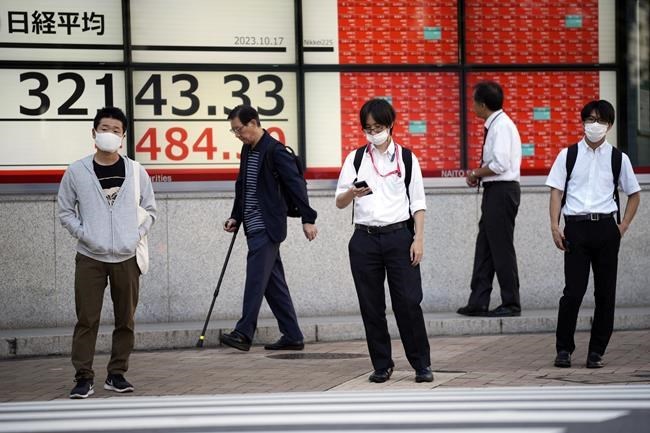NEW YORK (AP) — Wall Street drifted following the latest signal that the U.S. economy remains solid, though perhaps too strong for the Federal Reserve’s liking. The S&P 500 closed just barely lower Tuesday after flipping between small gains and losses through the day. The Dow added 13 points, and the Nasdaq composite fell 0.3%. Treasury yields rose in the bond market after a report showed shoppers spent more at U.S. retailers last month than expected. That’s a sign of a healthy economy, but it may also indicate upward pressure on inflation and could push the Federal Reserve to keep interest rates high.
THIS IS A BREAKING NEWS UPDATE. AP’s earlier story follows below.
NEW YORK (AP) — Wall Street is drifting Tuesday following the latest signal that the U.S. economy remains solid, though perhaps too strong for the Federal Reserve’s liking.
The S&P 500 was 0.2% lower in late trading after flipping between small gains and losses through the day. The Dow Jones Industrial Average was down 39 points, or 0.1%, with less than an hour remaining in trading, and the Nasdaq composite was 0.4% lower.
Financial markets have been shaky in recent weeks due to worries about war in the Middle East and its potential impact on oil prices. But those worries have receded a bit to put the focus back on what usually drives the stock market’s long-term movements: where interest rates, the economy and corporate profits are heading.
A report Tuesday morning showed shoppers spent more at U.S. retailers last month than economists expected. That’s a sign of a healthy economy and likely a result of a still-solid job market, which should help to support profits at companies.
But a too-hot economy could also provide inflation with more fuel and push the Fed to keep interest rates high to suffocate it. Such a move would hurt prices for stocks and other investments at the same time.
The Fed is trying to pull off a delicate balancing act where it slows the economy just enough to drive down high inflation but not so much that it causes a painful recession.
Treasury yields in the bond market rose after the release of the report. The yield on the 10-year Treasury climbed to 4.84% from 4.69% late Monday.
A sharp jump since the summer in the 10-year yield has weighed on the stock market, as traders increasingly accept the Fed’s forecasts that it will likely keep rates high for a long time. The central bank has already pulled its main interest rate to the highest level since 2001 and is debating whether to increase it one more time.
High rates and yields hurt prices for all kinds of stocks, and they tend to particularly hit companies bid up on expectations for growth far in the future and stocks seen as expensive. That’s often put Big Tech stocks in the spotlight, and a 5.2% drop for Nvidia and 1.2% slip for Apple were two of the heaviest weights on the S&P 500.
Nvidia and other chipmakers were under extra pressure after the U.S. government broadened restrictions to stop China from acquiring advanced computer chips and the equipment to manufacture them.
Several big U.S. companies, meanwhile, were rising following their latest earnings reports.
Bank of America was helping to lead the market with a 2.1% gain after it beat Wall Street’s profit forecasts for the third quarter. It benefited from higher interest rates, but CEO Brian Moynihan also warned Americans continue to slow their spending after burning through the savings they had built up during the pandemic.
Bank of New York Mellon rose 4% after it also reported stronger profit than expected for the latest quarter.
Johnson & Johnson fell 1.8% after bouncing between small gains and losses. It reported profit and revenue that fell short of analysts’ expectations, according to FactSet.
The broad expectation for companies across the S&P 500 index is that profits returned to growth during the summer for the first time in a year.
Wyndham Hotels & Resorts rose 8.7% after rival Choice Hotels International said it wants to buy the company for $90 per share in cash and stock, valuing it at $7.8 billion.
The two had earlier been talking about a possible deal, Choice CEO Patrick Pacious said, but Wyndham walked away after they were “in a negotiable range on price and consideration.”
Choice shares fell 6.3%.
In stock markets abroad, indexes ended mixed in Europe after rising more solidly across Asia.
Crude oil prices were holding somewhat steadier after swinging sharply in recent weeks on worries that war in the Middle East could lead to disruptions in supplies if it drew in Iran or other major oil-producing countries.
A barrel of U.S. crude for delivery in November was unchanged at $86.66 after bouncing between gains and losses through the day. and Brent crude, the international standard, rose 25 cents to $89.90.
“I wouldn't say it's in the background,” said Andrew Lipow, president of Lipow Oil Associates, about the war in Gaza's effect on oil traders.
“I think they're just waiting. That's the worry, that infrastructure does get impacted.”
___
AP Business Writers Matt Ott and Elaine Kurtenbach contributed.
Stan Choe, The Associated Press



